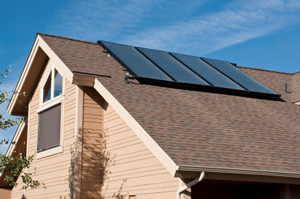In Business Since | License #
In Business Since | License #


Solar thermal panels (shown) heat water for either space heating or domestic water heating, or both.
Unlike passive solar heating, which simply involves absorbing the warmth of the sun, "active" solar heating requires electrical power to distribute air or liquid that has been heated by the sun. There are several types of active solar heating used in houses.
To see if active solar heating is a viable option for your home, have a Dr. Energy Saver contractor perform an inspection and home energy audit. One way or the other, you can experience significant energy savings and increased comfort in your home!
Perhaps the simplest type of active solar heating system is an air-based system that distributes solar-heated air throughout all or some of the living space using ceiling and/or other fans. The source or collection point for solar-heated air might be an attached sunspace, a living room or even a hallway that has good solar exposure and insulated glass to admit plenty of sunlight. The fans used to distribute hot air can be manually or automatically operated.
Solar thermal heating is another type of active solar heating system that can effectively harness the power of the sun. In this type of system, water or an antifreeze solution is warmed by the sun in a solar collector that can be mounted on the roof or on the ground. When the liquid in the collector reaches a present temperature, it is pumped to a storage tank or to a heat exchanger that heats water. Depending on how the system is designed, the warmed fluid can be pumped through tubing in a radiant floor heating system or to an air handler in a hydro-air system.
Whether a house utilizes an air-based active solar heating system or a solar thermal heating system, some form of backup heating system is necessary. Otherwise, building inhabitants will be very cold at night and during overcast weather. Certain types of central heating are compatible with different active solar heating systems. For example, a forced-air heating system would be compatible with an air-based active solar system. A solar thermal system can be effectively integrated with any type of hydronic (water-based) heating system.
Harnessing a renewable energy source like the sun isn't an excuse to ignore important energy-saving improvements like air sealing and upgrading home insulation. When performed together, these two upgrades can reduce heating and cooling expenses by as much as 40%. Reducing energy use is just as important as producing energy from renewable resources. Contact your local Dr. Energy Saver to employ all of these energy-saving tactics - schedule your home energy audit today!
Looking for a price? Get a no cost, no obligation free estimate.